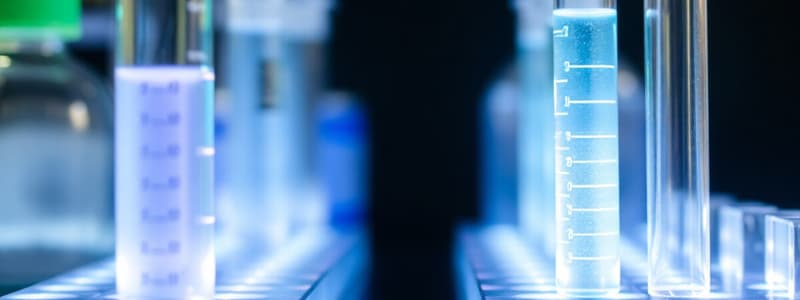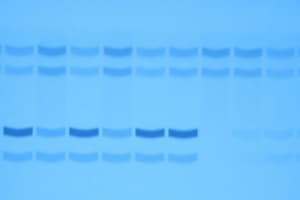Podcast
Questions and Answers
What is the main factor that affects the linear mobility of proteins during SDS-PAGE?
What is the main factor that affects the linear mobility of proteins during SDS-PAGE?
- Time of electrophoresis
- Mass of the proteins (correct)
- pH of the gel
- Charge of the proteins
Which staining method is most sensitive, detecting down to approximately 1 ng of protein per band?
Which staining method is most sensitive, detecting down to approximately 1 ng of protein per band?
- SYPRO fluorescent stains
- Coomassie brilliant blue
- Silver staining (correct)
- Bradford staining
What can significantly affect the effectiveness of silver staining?
What can significantly affect the effectiveness of silver staining?
- Type of gel used
- Presence of artifacts and contaminants (correct)
- Temperature of incubation
- Concentration of protein
How does fluorescent staining, such as SYPRO, primarily visualize proteins on a gel?
How does fluorescent staining, such as SYPRO, primarily visualize proteins on a gel?
Which of the following statements about SDS-PAGE is NOT true?
Which of the following statements about SDS-PAGE is NOT true?
What is the typical loading amount of protein per lane in SDS-PAGE?
What is the typical loading amount of protein per lane in SDS-PAGE?
What is a major limitation of the silver staining method when compared to Coomassie staining?
What is a major limitation of the silver staining method when compared to Coomassie staining?
What is the purpose of destaining in the Coomassie brilliant blue staining process?
What is the purpose of destaining in the Coomassie brilliant blue staining process?
What is the purpose of using nitrocellulose in western blotting?
What is the purpose of using nitrocellulose in western blotting?
Which type of transfer method is mentioned for western blotting?
Which type of transfer method is mentioned for western blotting?
What role do secondary antibodies play in western blotting?
What role do secondary antibodies play in western blotting?
Why is tubulin detection significant in the western blotting process?
Why is tubulin detection significant in the western blotting process?
What does western blotting allow researchers to visualize?
What does western blotting allow researchers to visualize?
What does protein mobility on a western blot correlate with?
What does protein mobility on a western blot correlate with?
Which type of staining is mentioned for visualizing proteins after blotting?
Which type of staining is mentioned for visualizing proteins after blotting?
What can the varying bands in a western blot represent?
What can the varying bands in a western blot represent?
What is the primary function of gels in electrophoresis?
What is the primary function of gels in electrophoresis?
Why does agarose create large pores in gels?
Why does agarose create large pores in gels?
Which of the following statements about polyacrylamide gels is true?
Which of the following statements about polyacrylamide gels is true?
What effect does the electric current have on electrophoresis during the process?
What effect does the electric current have on electrophoresis during the process?
In the context of electrophoresis, what does the gel primarily reduce?
In the context of electrophoresis, what does the gel primarily reduce?
Which component of agarose is critical for its use in the food industry?
Which component of agarose is critical for its use in the food industry?
What characteristic of the electropherogram is highlighted in the statement?
What characteristic of the electropherogram is highlighted in the statement?
What type of structure does agarose gel create to facilitate the electrophoresis of macromolecules?
What type of structure does agarose gel create to facilitate the electrophoresis of macromolecules?
What is the primary role of the electrical field in electrophoresis?
What is the primary role of the electrical field in electrophoresis?
What occurs to negatively charged species during electrophoresis?
What occurs to negatively charged species during electrophoresis?
How can proteins be given a net negative charge for electrophoresis?
How can proteins be given a net negative charge for electrophoresis?
What was Arne Tiselius known for in the context of electrophoresis?
What was Arne Tiselius known for in the context of electrophoresis?
Which statement accurately describes the motion of ions in an electric field during electrophoresis?
Which statement accurately describes the motion of ions in an electric field during electrophoresis?
How did the original Tiselius electrophoresis apparatus detect proteins?
How did the original Tiselius electrophoresis apparatus detect proteins?
What are the main components present in the electrophoresis profile of serum proteins?
What are the main components present in the electrophoresis profile of serum proteins?
In which way does a gel medium influence the electrophoresis process?
In which way does a gel medium influence the electrophoresis process?
What is the primary benefit of using phosphorylation state-specific antibodies (PSSAs)?
What is the primary benefit of using phosphorylation state-specific antibodies (PSSAs)?
What is the first step in the purification of phospho-specific antibodies?
What is the first step in the purification of phospho-specific antibodies?
Why is Western blotting considered semi-quantitative?
Why is Western blotting considered semi-quantitative?
Which of the following is a potential weakness of Western blotting?
Which of the following is a potential weakness of Western blotting?
What is the purpose of using a synthetic phosphorylated peptide in the production of PSSAs?
What is the purpose of using a synthetic phosphorylated peptide in the production of PSSAs?
What technique combines SDS-PAGE and antibody detection in Western blotting?
What technique combines SDS-PAGE and antibody detection in Western blotting?
What was the objective of applying BBT594 in the study with SET-2 human leukemia cells?
What was the objective of applying BBT594 in the study with SET-2 human leukemia cells?
Which of the following correctly identifies a key application of Western blotting?
Which of the following correctly identifies a key application of Western blotting?
What is the main function of bis-acrylamide in polyacrylamide gel formation?
What is the main function of bis-acrylamide in polyacrylamide gel formation?
Which component is crucial for the initiation phase of polyacrylamide polymerization?
Which component is crucial for the initiation phase of polyacrylamide polymerization?
What does the 'T' represent in the composition of polyacrylamide gels?
What does the 'T' represent in the composition of polyacrylamide gels?
What is the purpose of SDS in the SDS-PAGE process?
What is the purpose of SDS in the SDS-PAGE process?
How does Dithiothreitol (DTT) affect protein molecules prior to electrophoresis?
How does Dithiothreitol (DTT) affect protein molecules prior to electrophoresis?
What represents the protein standard in SDS-PAGE?
What represents the protein standard in SDS-PAGE?
In an 8%, 19:1 acrylamide/bis-acrylamide gel, what is the percentage of bis-acrylamide?
In an 8%, 19:1 acrylamide/bis-acrylamide gel, what is the percentage of bis-acrylamide?
What type of polymerization mechanism is involved in the formation of polyacrylamide gels?
What type of polymerization mechanism is involved in the formation of polyacrylamide gels?
What happens when a plastic comb is removed after the stacking gel polymerizes?
What happens when a plastic comb is removed after the stacking gel polymerizes?
Why is it important to run SDS-PAGE with protein standards?
Why is it important to run SDS-PAGE with protein standards?
What is the relationship between electrophoresis mobility and molecular weight of proteins in SDS-PAGE?
What is the relationship between electrophoresis mobility and molecular weight of proteins in SDS-PAGE?
What might be a consequence of not adding TEMED during gel preparation?
What might be a consequence of not adding TEMED during gel preparation?
Which of the following best describes the purpose of the stacking gel in PAGE?
Which of the following best describes the purpose of the stacking gel in PAGE?
What does the term 'C' refer to in the gel composition of polyacrylamide?
What does the term 'C' refer to in the gel composition of polyacrylamide?
Flashcards
Electrophoresis
Electrophoresis
A technique that separates charged particles (like proteins) in a liquid medium using an electric field.
Charged species movement in electrophoresis
Charged species movement in electrophoresis
Negatively charged species move towards the anode (+ charge), while positively charged species move towards the cathode (- charge).
pH adjustment and protein charge
pH adjustment and protein charge
Adjusting the pH can alter the net charge of proteins, making them either negatively or positively charged.
Electric field calculation
Electric field calculation
Signup and view all the flashcards
Force on a charged particle
Force on a charged particle
Signup and view all the flashcards
Tiselius and electrophoresis
Tiselius and electrophoresis
Signup and view all the flashcards
Gel Medium in Electrophoresis
Gel Medium in Electrophoresis
Signup and view all the flashcards
Original Electrophoresis Method
Original Electrophoresis Method
Signup and view all the flashcards
SDS-PAGE
SDS-PAGE
Signup and view all the flashcards
SDS Coating
SDS Coating
Signup and view all the flashcards
Protein Mobility in SDS-PAGE
Protein Mobility in SDS-PAGE
Signup and view all the flashcards
Coomassie Brilliant Blue Staining
Coomassie Brilliant Blue Staining
Signup and view all the flashcards
Sensitivity of Coomassie Staining
Sensitivity of Coomassie Staining
Signup and view all the flashcards
Silver Staining
Silver Staining
Signup and view all the flashcards
Silver Staining Sensitivity
Silver Staining Sensitivity
Signup and view all the flashcards
Fluorescent Staining (e.g., SYPRO)
Fluorescent Staining (e.g., SYPRO)
Signup and view all the flashcards
Electrophoresis in gels
Electrophoresis in gels
Signup and view all the flashcards
Agarose gel pores
Agarose gel pores
Signup and view all the flashcards
Agarose gel properties
Agarose gel properties
Signup and view all the flashcards
Polyacrylamide gel
Polyacrylamide gel
Signup and view all the flashcards
Gel electrophoresis resolution
Gel electrophoresis resolution
Signup and view all the flashcards
Gel support in electrophoresis
Gel support in electrophoresis
Signup and view all the flashcards
Convective mixing
Convective mixing
Signup and view all the flashcards
Electropherogram resemblance to chromatogram
Electropherogram resemblance to chromatogram
Signup and view all the flashcards
Acrylamide
Acrylamide
Signup and view all the flashcards
Bis-acrylamide
Bis-acrylamide
Signup and view all the flashcards
T (total %)
T (total %)
Signup and view all the flashcards
C (%)
C (%)
Signup and view all the flashcards
Free-radical mechanism
Free-radical mechanism
Signup and view all the flashcards
Initiation phase
Initiation phase
Signup and view all the flashcards
Ammonium persulfate (APS)
Ammonium persulfate (APS)
Signup and view all the flashcards
TEMED
TEMED
Signup and view all the flashcards
Propagation phase
Propagation phase
Signup and view all the flashcards
SDS
SDS
Signup and view all the flashcards
DTT
DTT
Signup and view all the flashcards
Protein standard
Protein standard
Signup and view all the flashcards
Molecular weight
Molecular weight
Signup and view all the flashcards
Phospho-specific Antibodies (PSSAs)
Phospho-specific Antibodies (PSSAs)
Signup and view all the flashcards
PSSA Production
PSSA Production
Signup and view all the flashcards
Western Blotting with PSSAs
Western Blotting with PSSAs
Signup and view all the flashcards
STAT5 Activation
STAT5 Activation
Signup and view all the flashcards
Western Blotting Principle
Western Blotting Principle
Signup and view all the flashcards
Western Blotting Strengths
Western Blotting Strengths
Signup and view all the flashcards
Western Blotting Limitations
Western Blotting Limitations
Signup and view all the flashcards
Western Blotting
Western Blotting
Signup and view all the flashcards
Nitrocellulose Membrane
Nitrocellulose Membrane
Signup and view all the flashcards
Antibodies in Western Blotting
Antibodies in Western Blotting
Signup and view all the flashcards
Loading Control
Loading Control
Signup and view all the flashcards
Ponceau S Stain
Ponceau S Stain
Signup and view all the flashcards
Visualizing target protein
Visualizing target protein
Signup and view all the flashcards
Advantages of Western Blotting
Advantages of Western Blotting
Signup and view all the flashcards
Applications of Western Blotting
Applications of Western Blotting
Signup and view all the flashcards
Study Notes
Electrophoresis
- Electrophoresis is a technique that uses an electrical field to separate charged species through a liquid medium.
- The Greek word "phoresis" means "being carried."
- Negatively charged species migrate towards the anode (+ charge).
- Positively charged species migrate towards the cathode (- charge).
- Proteins can be given a net charge by adjusting the pH or binding anionic lipids/surfactants.
- A gel medium can enhance resistance to the movement of charged species and improve resolution.
Electrophoresis: Theory
- The electric potential (E) is given by the formula E = dV/dx, where dV is the change in voltage and dx is the change in distance.
- The force (F) on an ion in an electric field (E) is given by F = qE, where q is the charge of the species and z is the valence of the ion.
- The elementary charge (e) is 1.6 × 10⁻¹⁹ Coulombs.
Current in Electrophoresis
- Current is carried by both cations and anions.
- When E = 0, the protein anion is surrounded by a “cloud” of shielding cations.
- When E > 0, the anions and cations are pulled in opposite directions.
Tiselius: Founder of Protein Electrophoresis
- Arne Tiselius developed protein electrophoresis.
- In 1948, he received the Nobel Prize in Chemistry for his work on electrophoresis, specifically for his discoveries regarding the complex nature of serum proteins.
- Original protein electrophoresis was done in the liquid phase.
- The protein sample migrated through a buffer to either the anode or cathode.
- Refractive index changes allowed detection of protein movement.
Gels
- Modern electrophoresis almost always uses gels as a medium.
- Gels are loose mesh-works of a polymer, typically chemical or long-chain polysaccharide.
- The spaces between the polymer are larger than macromolecules.
- Gels offer resistance to movement but lessen diffusion.
- Gels provide support, enabling later procedures like staining and imaging.
Agarose (Agar)
- Agarose is a polysaccharide extracted from red algae.
- The structure is a (1→4)-β-D-galactopyranose-(1→3)-β-D-galactopyranose repeat unit
- Agar is used in foods needing a viscous texture.
- Agarose gels melt at high temperatures and solidify on cooling.
- This forms a mesh with pores suited to various applications.
- Widely used in chromatography and DNA electrophoresis.
Polyacrylamide Gels
- Polyacrylamide gels are extensively used in chromatography and electrophoresis.
- Formed by polymerization of acrylamide with methylene-bis-acrylamide crosslinker.
- Co-polymerization produces a mesh-like network.
- Acrylamide is a common choice for protein gels.
- Some DNA sequencing also utilizes polyacrylamide gels.
Polyacrylamide Gel Electrophoresis (PAGE)
- The PAGE apparatus consists of a gel between two electrodes for applying an electric field across the gel.
- Samples are loaded into wells to start the process.
- The gel's structure guides protein movement, separating them based on size and charge.
SDS-PAGE
- SDS-PAGE, using SDS and DTT to linearize proteins, is a common method.
- SDS coats proteins with a negative charge and linearizes the shape, making the separation based solely on molecular weight (MW).
Protein Standards
- Protein standards are used in SDS PAGE gel to compare with unknown proteins.
- They often have pre-stained bands to enable easy identification.
- Standards allow estimation of an unknown protein's MW.
Western Blotting
- Western blotting combines SDS-PAGE with antibody detection to determine the presence of specific proteins.
- Transfer of separated proteins from the gel onto a membrane like a nitrocellulose membrane.
- Detection of target proteins using antibodies specific to the protein of interest.
- A labeled secondary antibody binds to the primary antibody, showing the location and quantity of the desired protein.
Isoelectric Focusing (IEF)
- IEF is a high-resolution technique to separate proteins based on their isoelectric point (pI).
- It takes advantage of the pH gradient produced within the gel..
- Proteins migrate to a position in the gel where their pI matches the local pH.
Two-Dimensional Electrophoresis (2-D)
- 2-D electrophoresis combines IEF (1st dimension) and SDS-PAGE (2nd dimension).
- The technique allows the separation of hundreds of proteins present in a given sample based on both pI and MW properties.
DIGE (Differential in-Gel Electrophoresis)
- DIGE uses fluorescent dyes to label proteins for detection of expression changes under different conditions.
- Dyes allow overlay and comparison to understand differential expression patterns.
- Images are combined digitally for analysis, often related to protein separation/detection.
Other methods
- Coomassie brilliant blue and silver staining enable visualizing and quantifying protein bands on a gel.
- Fluorescent stains, like SYPRO, can visualize protein bands with high sensitivity/throughput.
Studying That Suits You
Use AI to generate personalized quizzes and flashcards to suit your learning preferences.




